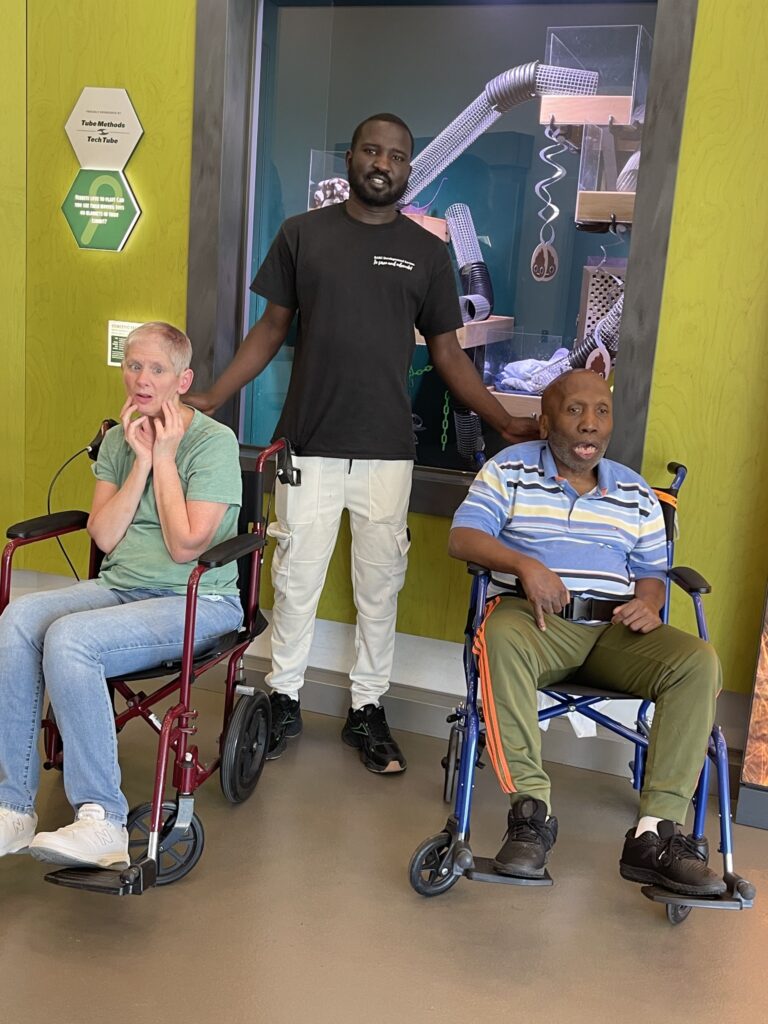What Is a Direct Support Professional?
If you’ve ever heard the term direct support professional (DSP) and wondered what it means, you’re not alone. DSPs are the backbone of services for people with intellectual and developmental disabilities, yet their work is often overlooked. Understanding what DSPs do, the challenges they face, and the importance of supporting them is essential to strengthening our communities.
What Is a DSP Worker?
DSPs are trained caregivers who help people with disabilities live as independently as possible. Unlike nurses or therapists who focus on medical care, DSPs provide daily support that empowers individuals to participate fully in their communities. They often work in group homes, day programs, or private residences, offering both practical assistance and emotional encouragement.
At its core, the DSP role is about promoting dignity, choice, and quality of life for the individuals they serve.
What Does a Direct Support Professional Do?
The responsibilities of a direct support professional can vary widely depending on the setting and the individual’s needs. Common responsibilities include:
- Daily living support: DSPs help with tasks like cooking, cleaning, transportation, and personal care, ensuring that individuals can live comfortably and safely.
- Community engagement: They assist with shopping, attending classes, volunteering, and participating in social activities to build belonging and independence.
- Skill development: DSPs often teach or reinforce skills such as money management, communication, or job readiness, helping people reach personal goals.
- Advocacy: They speak up for individuals’ rights, ensuring that their voices are heard in educational, medical, and community settings.
In short, DSPs play a vital role in helping people live meaningful, self-directed lives.
Challenges Faced by DSPs
While deeply rewarding, DSP work comes with its share of challenges. Many DSPs report:
- Low pay and high turnover: Despite the critical nature of their work, DSPs are often underpaid compared to other caregiving roles.
- Emotional demands: Building close relationships with the people they support can be fulfilling for DSPs, but it can also make coping with setbacks or crises emotionally difficult.
- Physical stress: Some DSP duties, such as lifting, assisting with mobility, or managing challenging behaviors, can be physically demanding.
- Workforce shortages: High turnover rates and staff shortages can lead to long hours and heavy workloads for those who remain.
The Rewards of Being a DSP
Despite the challenges, many DSPs describe their work as a calling rather than just a job. The rewards include:
- Making a difference: Helping someone achieve independence or celebrate a personal milestone creates a sense of purpose.
- Building connections: DSPs often form strong, lasting relationships with the people they support and their families.
- Developing skills: The role builds patience, problem solving, and leadership abilities that can be valuable in many career paths.
For many, the opportunity to positively impact another person’s life outweighs the difficulties.
Why DSPs Are Essential
DSPs are an important part of creating thriving and welcoming communities. Without them, many individuals with disabilities would face limited opportunities to live, work, and participate in society. DSPs ensure that people are not just surviving but flourishing — working, volunteering, and connecting with others in meaningful ways.
The COVID-19 pandemic underscored how essential these workers are, as many DSPs continued to provide frontline care under difficult conditions. Their dedication deserves lasting recognition and investment.
How to Support Direct Support Professionals
Supporting DSPs means supporting both the workers themselves and the individuals they serve. Communities, employers, and policymakers can help by:
- Advocating for fair wages: Ensuring DSPs are compensated fairly for their essential work reduces turnover and improves stability of care.
- Offering training and career development: Investing in DSP education helps them stay motivated and improves quality of care.
- Showing appreciation: Recognizing the contributions of DSPs boosts morale, whether it’s accomplished through community events, workplace recognition, or public campaigns such as Direct Support Professionals Recognition Week in September.
- Raising awareness: Educating the public about what DSPs do helps ensure they are valued as professionals, not just as caregivers.
By providing resources and recognition, society can strengthen the DSP workforce and improve outcomes for people with intellectual disabilities and autism.
Support DSPs With BARC Developmental Services
At BARC Developmental Services, direct support professionals are at the heart of everything we do. Our DSPs work tirelessly to help individuals with autism and intellectual disabilities achieve independence, pursue goals, and connect with their communities. By supporting BARC, you’re not only empowering people with disabilities — you’re also uplifting the dedicated professionals who make this progress possible.
Located in Bucks County, Pennsylvania, BARC Developmental Services assists and supports individuals with intellectual disabilities and autism. We equip them to reach their fullest potential, lead happy lives, and contribute to their community. With early intervention services, residential programs, and vocational initiatives, we serve hundreds of individuals and aim to help many more. Donate today to make impactful change in the lives of individuals with intellectual disabilities and autism!

